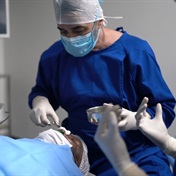Ongoing trials of the Argus II Retinal Prosthesis System (Second Sight Medical Products) show that it returns useful visual perception to patients rendered blind by outer retinal degeneration.
Dr Mark S Humayun, who headed a recently published study, told Reuters Health by email that thanks to "advanced bioelectronics engineering" the Argus II implant "is no longer a research or experimental device but now an approved medical implant in Europe making it the first ever retinal implant to achieve this status".
The system was approved for use in Europe in 2011, and Dr Brian Mech of Second Sight told Reuters Health that the company has applied for FDA approval as well. "We are hopeful that we will get it this year," he said. "We are not yet discussing our future trial plans publicly."
Components of the system are fixed to the sclera outside of the eye, and an electrode array is fixed on the retina. A camera mounted on a pair of glasses communicates with the implant.
Dr Humayun, from the University of Southern California, and colleagues reported earlier this month on interim results from a trial of the system in 30 patients. All had been followed at least six months (to a maximum of 2.7 years) after implantation.
Significant improvement
A paper online in Ophthalmology reports that 70% of patients have been free of serious adverse events – but the other 30% have experienced 17 such events, including 14 in the first six months. The most common were conjunctival erosion or dehiscence over the extra ocular implant. All but one was successfully treated; one patient needed to have the device removed.
Adverse events became less frequent later in the study due to improved surgical techniques and device modifications, according to the authors.
Endpoints included visual acuity tests with computer monitors and in the real world, for example, finding a door, and following a white line on the floor.
When the devices were switched on, 96% of subjects did significantly better in location of objects, 57% did better in motion discrimination and 23% had improved orientation recognition.
Overall, the subjects' mean performance on orientation and mobility tasks was significantly better when the system was on. The best recorded visual acuity was 20/1260.
(David Douglas, Reuters Health, January, 2012)




 Publications
Publications
 Partners
Partners














